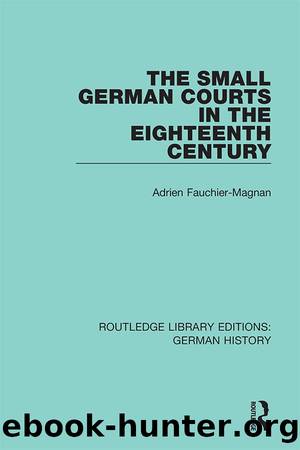The Small German Courts in the Eighteenth Century by Adrien Fauchier-Magnan

Author:Adrien Fauchier-Magnan [Fauchier-Magnan, Adrien]
Language: eng
Format: epub
Tags: Nonfiction, History, Germany
ISBN: 9781000007688
Google: 4gBoAAAAMAAJ
Publisher: Taylor and Francis
Published: 2019-06-26T04:00:00+00:00
CHAPTER TWELVE
Duke Karl-Alexander
The Württemberg succession fell to a collateral branch, represented at the time by Karl-Alexander, first cousin of Eberhard-Ludwig.
This prince, who was born in 1684, had spent his childhood in Brussels and so had learned only to speak but not to write German. Entering Austrian service at the age of twelve, he later fought in Italy, the Low Countries, Hungary and Serbia under the orders of Prince Eugène, whose right arm he was considered to be. The victory of Peterwarden earned him a Golden Fleece, a field-marshalâs baton, two imperial regiments and the governorship of Serbia with its capital, Belgrade. His military life had not, however, hindered his education as a gentleman, and he led a gay life one winter in Venice.1 In Vienna he was on intimate terms with the Vice-Chancellor of the Empire, Count Schönborn, Bishop of Würzburg, who initiated him into the mysteries of politics.
1 Venice was the scene of an adventure which proved that he was not lacking in a sense of humour. Some Venetian nobles had boasted in his presence of their traditions of culture and mocked the coarseness and ignorance of the Germans. The prince did not say a word but prepared his reply in secret. On the eve of his departure he gave a farewell supper-party followed by a little comedy whose theme he himself had suggested. The curtain rose on a street scene by night. In a dark corner stood the ghost of Cicero. A townsman appeared and knocked at his front door to be let in. He pulled out his watch and consulted it, then to while away the time he started to read a book. At last in the hope of rousing the porter from his sleep he fired a pistol shot. Cicero approached and asked to see the watch, the book and the pistolâall objects quite unknown to him. âThese are all thingsâ, said the townsman, âwhich the barbarous Germans have invented. And what have you Italians produced?â At this moment a hawker arrived with his waresâa few strips of common linen âand the curtain fell. The allegory was too obvious to be missed by the audience. A few of the indignant guests were soon looking for their host to ask the meaning of this bravadoâbut the prince had disappeared.
Karl-Alexander, upon whom honours and remunerative posts had been heaped, always seemed to be short of money. His friend the bishop, tired of incessant calls on his purse, thought that only a rich marriage could rid him of this inveterate sponger. He contrived a match which combined all the requisite conditions. The lady in question was the beautiful, elegant, twenty-one-year-old Maria Augusta, only daughter of the Prince of Thurn and Taxis, master of all the posts of the Empire, and in consequence an immensely rich man. This alliance also brought an unexpected advantage to the Church: the Princess, being a Catholic, insisted that her husband should abjure the Protestant faith.
The marriage took place in 1727 in Ratisbon Cathedral. The
Download
This site does not store any files on its server. We only index and link to content provided by other sites. Please contact the content providers to delete copyright contents if any and email us, we'll remove relevant links or contents immediately.
Harry Potter and the Goblet Of Fire by J.K. Rowling(3023)
Never by Ken Follett(2869)
Shadow of Night by Deborah Harkness(2709)
Ogilvy on Advertising by David Ogilvy(2677)
Zero to IPO: Over $1 Trillion of Actionable Advice from the World's Most Successful Entrepreneurs by Frederic Kerrest(2371)
The Man Who Died Twice by Richard Osman(2289)
Machine Learning at Scale with H2O by Gregory Keys | David Whiting(2263)
Book of Life by Deborah Harkness(2258)
How Proust Can Change Your Life by Alain De Botton(2255)
My Brilliant Friend by Elena Ferrante(2217)
0041152001443424520 .pdf by Unknown(2213)
The Tipping Point by Malcolm Gladwell(2198)
How to Pay Zero Taxes, 2018 by Jeff A. Schnepper(2094)
Will by Will Smith(2031)
Purple Hibiscus by Chimamanda Ngozi Adichie(1977)
Hooked: A Dark, Contemporary Romance (Never After Series) by Emily McIntire(1932)
Borders by unknow(1779)
Rationality by Steven Pinker(1759)
Daughter of Smoke and Bone by Laini Taylor(1737)
